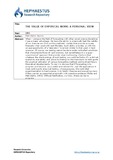| dc.contributor.author | Makridakis, Spyros | |
| dc.date.accessioned | 2015-12-08T11:09:08Z | |
| dc.date.available | 2015-12-08T11:09:08Z | |
| dc.date.issued | 1993 | |
| dc.identifier.issn | 0169-2070 | |
| dc.identifier.uri | http://hdl.handle.net/11728/6385 | |
| dc.description.abstract | When I compare the field of forecasting with other social science disciplines I see a major advantage. We have the ability to empirically test the validity of our theories and find out the methods/ models that provide accurate forecasts when used with real-life data. Such ability provides us with the unique opportunity of a ‘laboratory’ type tool similar to that used in hard sciences. Of course, our testing cannot be done under controlled conditions that characterize those of hard sciences, but nevertheless it is a quasi-experimental’ approach that permits empirical testing. I believe that whatever the shortcomings of such testing we would be foolish if we did not exploit its availability and utilize its findings to the maximum: to both guide the practical utilization of various forecasting methods and to direct future theoretical developments. To me it is obvious that if forecasting is to progress and become more useful and relevant for real-life applications it must continue its empirical testing, whose purpose, like controlled experimentation in hard science, is to ‘falsify’ theories and prevailing views if they cannot be supported empirically with objective evidence (Fildes and Makridakis, 1993). Without falsification, we know, there can be no progress. | en_UK |
| dc.language.iso | en | en_UK |
| dc.publisher | Elsevier | en_UK |
| dc.relation.ispartofseries | International Journal of Forecasting;Volume 9 | |
| dc.rights | Copyright © 1993 Published by Elsevier B.V. | en_UK |
| dc.rights.uri | http://creativecommons.org/licenses/by-nc-nd/4.0/ | en_UK |
| dc.subject | Forecasting | en_UK |
| dc.subject | Forecasting methods | en_UK |
| dc.subject | Makridakis competition | en_UK |
| dc.title | The value of empirical work: A personal view | en_UK |
| dc.type | Article | en_UK |
| dc.doi | 10.1016/0169-2070(93)90050-W | |


